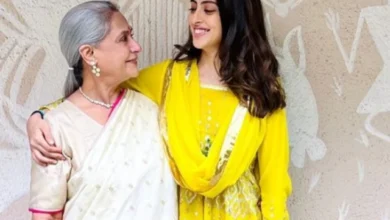Review of Kabuliwala: Mithun Chakraborty Gives An Amazingly Touching Performance
Why would a filmmaker based in Kolkata in the twenty-first century feel the need to draw inspiration from a narrative that was published some 130 years ago? In his version of Rabindranath Tagore’s 1892 short tale, Kabuliwala, filmmaker Suman Ghosh provides a resounding response to whatever doubts you may have—one that is neither wrong nor unjustified. There is no denying the film’s relevance now.

Only 10 years had passed since India gained its independence when the story was last brought to the big screen. Four years after Tapan Sinha’s 1957 Bengali Kabuliwala, a Hindi adaptation of the tale under the direction of Hemen Gupta and produced by Bimal Roy, was released.
Considered among the best actors Indian cinema has ever produced are Chhabi Biswas and Balraj Sahni, who portrayed the title character Rahmat Khan, an Afghani traveler, and dry fruit vendor who forms a paternal bond with Mini, a Calcutta girl who reminds him of his daughter back home.
The Hindi movie Bioscopewala, which starred Danny Denzongpa, updated Kabuliwala and included Rahmat Khan as a traveling bioscope operator as recently as 2018. The girl he used to recount tales to become a French documentary filmmaker.
Produced by Shree Venkatesh Films and Jio Studios, Ghosh’s latest Bengali-Hindi film goes back to the core of the Tagore tale. Midway through the 1960s, in Kolkata. Rahmat Khan’s robes and turban are worn by Mithun Chakraborty, another accomplished actor.
As a lonely man compelled to leave his home in Afghanistan and make his way to India due to an outstanding debt, Chakraborty gives a really poignant performance. He is the picture of perfection from the first lines of the 106-minute movie, when he relates a narrative to his daughter Razia, to the last words of the film, which are mournful.
Although the main performance is unquestionably the story’s greatest asset, Kabuliwala also gains greatly from a strong supporting cast that includes Abir Chatterjee as Mini’s writer-father Aurobindo Mukherjee and Sohini Sarkar as the girl’s mother, Sneha. The youngest actress in the group, Anumegha Kahali, is certainly not the least outstanding. She steals the scene with an immediate charm.
The filmmaker and Sreejib’s script set the narrative in 1965, during the India-Pakistan conflict when Rahmat Khan was struggling to make ends meet in Calcutta and not having the best of times. This helps to contextualize and universalize the story of a displaced man’s quest for love in a foreign city. It’s common to incite fear.
A few minor changes are made to the plot, but they do not detract from Tagore’s ageless tale’s main humanist themes. Actually, they are used to highlight how love can bridge differences in geography, culture, language, and religion.
“I love you, Amit Uncle,” writes Mithun Chakraborty’s son Namashi in Amitabh Bachchan’s post on his film.
Ghosh uses no frills and whistles to tell the straightforward tale of a friendship between two pure-hearted beings. He creates a cohesive bundle of moods, emotions, and thematic emphases while adhering to the fundamentals of narrative. The subtle but evocative tone of the film is well complemented by the discreet camerawork of Subhankar Bhar, the precise editing of Sujay Datta Ray, and the restrained background soundtrack and songs by composer Indraadip Dasgupta.
Without using any too ornate tics, the place and the era are well depicted. Live radio commentary from a match on the Calcutta Maidan has references to Indian football legends Jarnail Singh and Chuni Goswami, evoking memories of a bygone age and the city’s everlasting love affair with the beautiful game.
Kabuliwala is a masterfully conceived and performed film that focuses on sentiments that are subtly nuanced to depict the tensions and prejudices that are unavoidably prevalent in a wartime city. This serves as a metaphor for both the period of time and place in which the film is set and the current period of unrest and mistrust that the entire world is experiencing.
Aurobindo remarks to his wife, “These are dark times in which people do not trust each other,” alluding to the prejudices that she and her family, notably the maid Mokkoda (Gulshanara Khatun), foster against Rahmat as the latter becomes more intimate with tiny Mini (Anumegha Kahali).
Mini asked Rahmat again, “What’s in your bag, Kabuliwala?” anticipates a greater impact considering how fragile the earth is. The genial, devout Pashtun from Jalalabad has no baggage, but being an outsider in a major city during wartime makes him a good target for hatred. He cannot even begin to comprehend the forces and individuals that start to affect his connection with Mini.
Rahmat and his compatriots reside in a small apartment in the center of the city. They are forced to restrict their interactions with the city and its residents to what is strictly necessary due to ongoing othering; in Rahmat’s case, this means hawking shawls, dried fruits, and asafoetida and acting as an agent for a moneylender.
He can only form a pure relationship with Mini, the cheerful little girl who embodies innocence, in the city. While Rahmat’s attraction to Mini is understood by the girl’s liberal father, the guy is viewed with scarcely concealed fear by everyone else. There are rumors circulating that he may be abducted. He is thought to be Pakistani by some.
Kabuliwala is a Mithun Chakraborty production, but Suman Ghosh’s film offers far more than what is shown by a single actor, performance, or plot point. This is because the screenplay upholds the spirit of Tagore’s unwaveringly inclusive vision. And within is a solid rebuttal to any skepticism about the film’s contemporary relevance.







